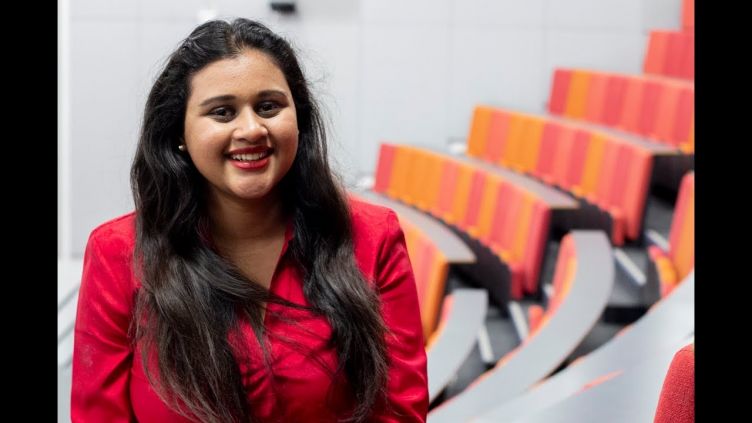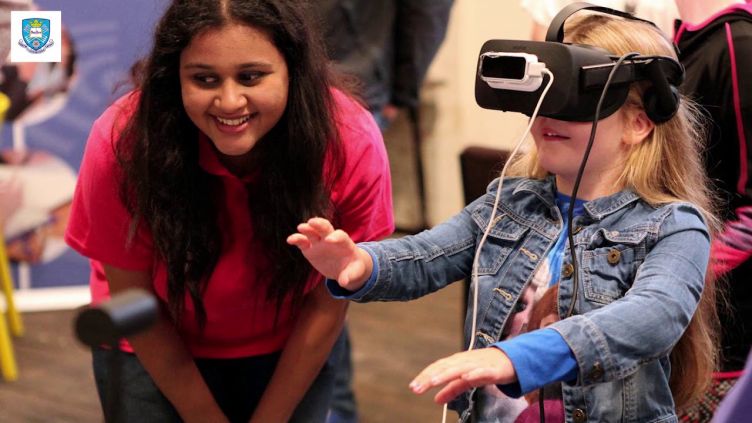I wanted a degree that could help to address the world's big-scale problems

Watch: our interview with Hemanshi
Transcript:
I chose Chemical and Biological Engineering at the University of Sheffield predominantly because today we've got big-scale problems and big-scale problems require certain solutions that I thought a chemical engineer can provide.
The degree itself was not heavily based on chemistry, it has a lot of biological elements, a lot of engineering and a lot of maths which I really loved so I was really inclined towards taking such a degree.
Chemical Engineering turns microscale ideas into macro-scale realities from the tiniest problems of electricity that we had a hundred years ago to today's food and energy crisis. Chemical engineers are involved in all sorts of problems and finding solutions to them so I felt that it would be a degree for me to actually change the world.
Sheffield feels like a second home to me. Locals are very friendly and accommodating of the international community and that was the biggest selling point for me as well, is how much cultural exposure you have
Hemanshi Galaiya
Chemical & Biological Engineering Alumna
Sheffield feels like a second home to me. After spending four years here, from the scared child who first reached Manchester Airport asking everybody how to get to Sheffield, to now knowing it like the back of my hand, I think it's a very vibrant city even though we're not a big metropolitan city like London and Manchester. There's a lot to do for everyone at the university and the culture around the city itself is really great.
Locals are very friendly and accommodating of the international community and that was the biggest selling point for me as well, to come to Sheffield, is how much cultural exposure you have. I don't have more than two friends from the same country which means I can check out cuisines from all over the world, I can experience a lot of different cultural expos and just integrate myself and get a bigger broader perspective and bigger horizons about all sorts of things and different perspectives.
The highlight of fourth year was when the university propelled me onto a platform that was international. I was awarded as a 25 Under 25 Young Achiever and I got to go to Washington DC for a whole week and attend a very prestigious conference. That has put me onto a platform where I can voice, not just the initiative of women in engineering, but also inspire a lot of young children to pursue careers in STEM and that for me has been the biggest achievement that I could get at university.
Watch: Hemanshi's journey with the Women in Engineering society
Just like a lot of young adults, I'm not very sure of what the future holds for me but I do know what I want to do in the next year. I am planning on taking a bit of a gap year; I do have an offer for a PhD and I might also end up in industry at some point but the gap year that I'm taking is to set up STEM clubs in Kenya.
I've travelled a long way, all the way from Nairobi to Sheffield, and being able to experience these two very different and very amazing worlds but one thing that stood out for me was how different the technologies were and how people perceive STEM in both these countries. So my achievement for the next year, or my set goals, are to try and create some STEM clubs to hopefully inspire the next generation of engineers in Kenya.
I believe the best thing about being an engineer is being able to actually impact the world. When an engineer makes a creation they don't just impact themselves, they interact with the community, they make changes in the world and as an engineer you have the opportunity to decide which direction you want to take this change in. Any technology that an engineer creates can make a massive change to this world and the triple bottom line of engineering is the environment, the economy, the people and their needs and I believe as an engineer you can find the best of all these three criteria to make the world a much better place.
The triple bottom line of engineering is the environment, the economy, the people and their needs and I believe as an engineer you can find the best of all these three criteria to make the world a much better place.
Hemanshi Galaiya
Chemical & Biological Engineering Alumna
We interviewed Hemanshi in 2019.

Experience Sheffield for yourself
The best way to find out what studying at Sheffield is like is to visit us. You'll get a feel for the atmosphere, the people, the campus and the city.


